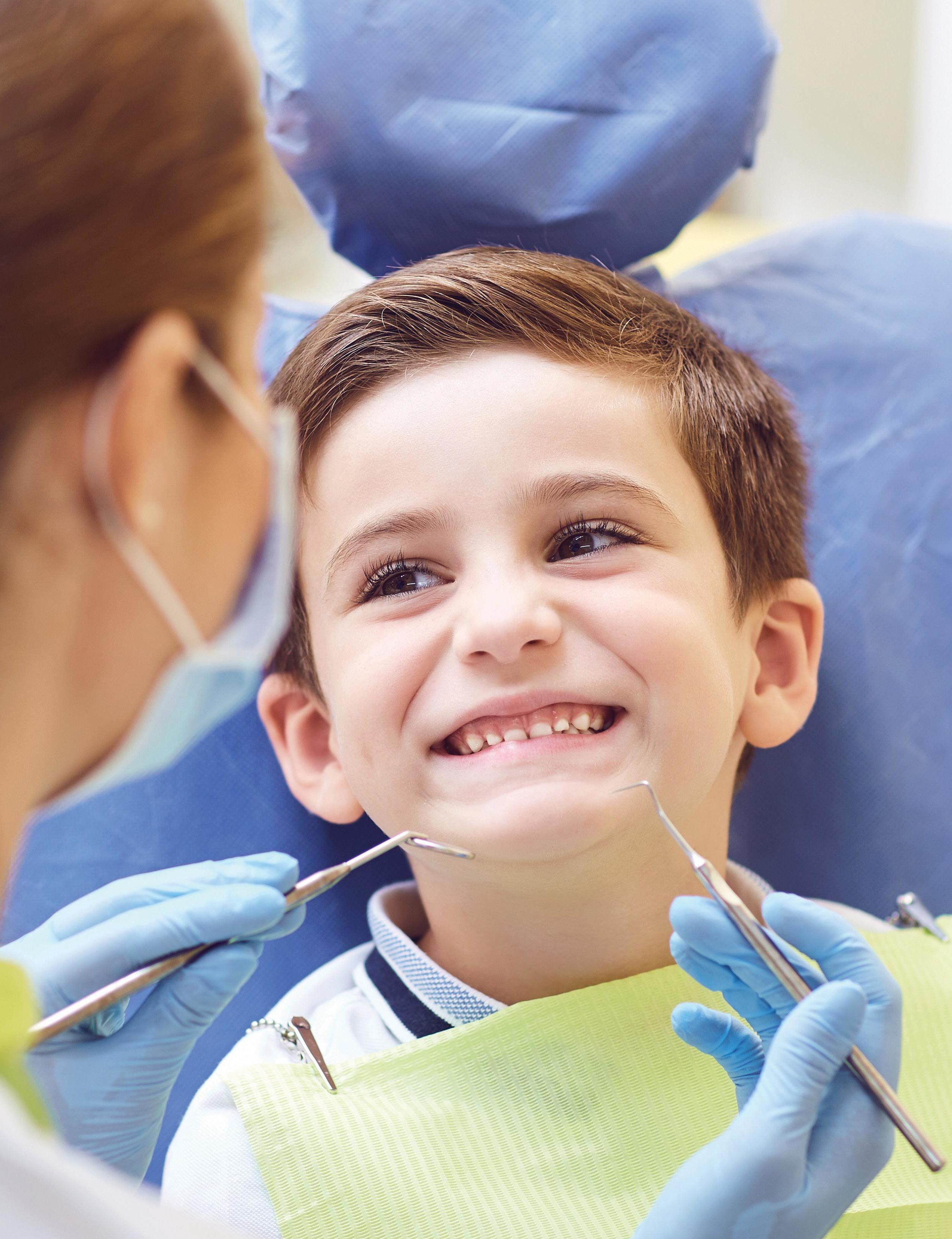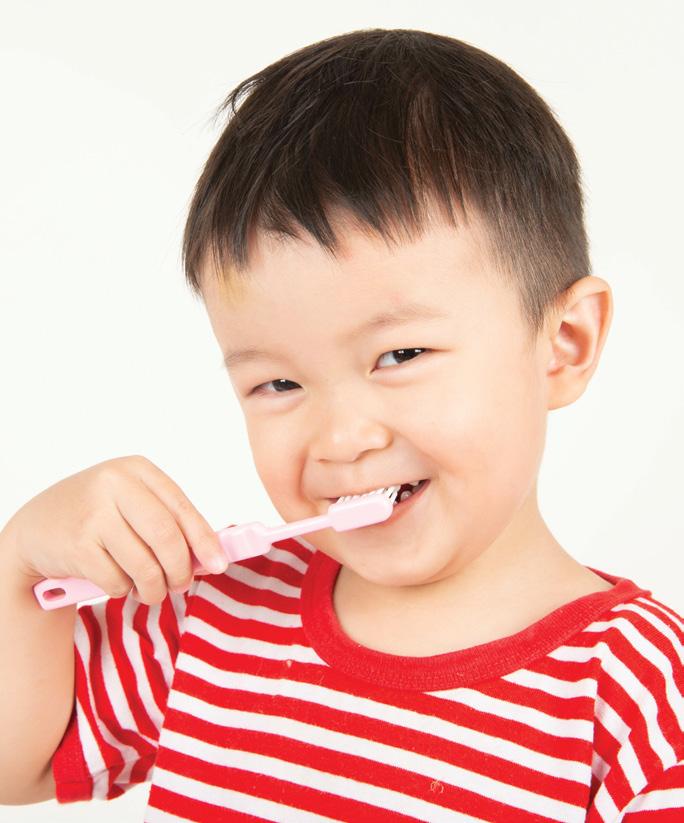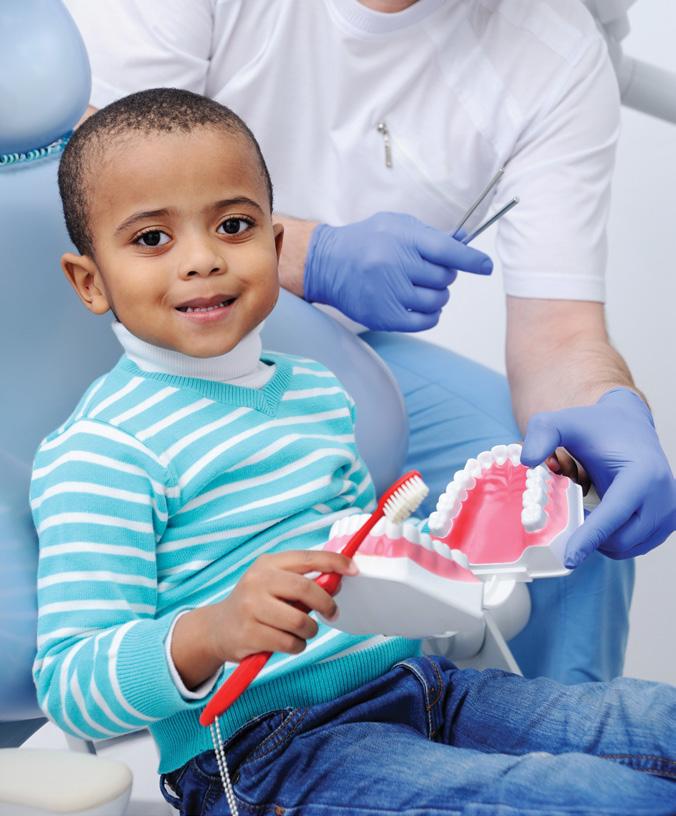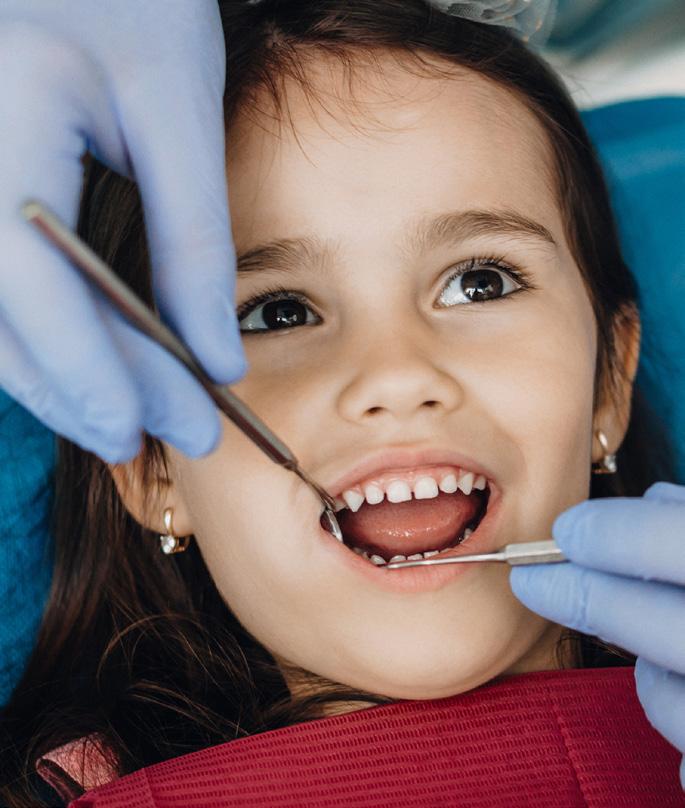
4 minute read
First Dental Visit
how to prepare your toddler or young child f0r a first dental visit
By Carol Muse Evans
Advertisement
February is National Children’s Dental Health Month, and it is a good time for parents of young children to consider the right time to introduce their child to professional dental care.
“According to the American Academy of Pediatric Dentistry, children should see a dentist at age one,” says Dr. Lauren Dean, a board-certified pediatric dentist at Red Mountain Pediatric Dentistry. “It’s so important to establish a dental home early for many reasons. A pediatric dentist will assess the child’s teeth for proper eruption and review diet and brushing techniques. The early visits get the child acquainted with dental visits which reduces denial anxiety. It’s also important to have an established dentist in case your child has trauma to their teeth or mount.
It may seem early, says Dr. Olga M. Sanchez-Hernandez, D.M.D., M.S., M.S., of McCalla Orthodontics & Pediatric Dentistry. “However, starting early is the key to a lifetime of good dental health. This dental visit should be thought of as a well-baby check up with the child’s physician,” Sanchez-Hernandez says. Sanchez-Hernandez says the first dental visit includes several important things such as:
•Review medical and dental histories. •Perform a complete oral examination to check growth and development, oral hygiene, pathology, injuries, cavities or other problems. • Review feeding practices that might lead to tooth decay. • Discuss teething, pacifier use, or finger/ thumb sucking habits. • Talk about common dental injuries and what to do if it happens. •Clean existing teeth and provide suggestions for dental daily care. • Evaluate the child’s fluoride needs to optimize the preventive benefits. • Discuss treatment if needed and schedule the next checkup visit.
Family Dentist or Pediatric Dentist? “I always recommend a pediatric dentist,” Dean says, “especially for younger kids. It’s similar to taking your child to a pediatrician versus a general practitioner. Pediatric dentists go through an additional two to three years of training after dental school, and during that residency, we are further trained in many areas such as child psychology, behavior management techniques, specialized treatment planning for baby teeth (they are actually different than adult teeth) and growth and development of the teeth and jaws.”

What to Say Before the Visit? Reactions vary greatly from child to child, SanchezHernandez says, and they can be a combination of the child’s personality, parental attitude towards treatment and child rearing practices. “You would be amazed to know most children are naturally curious and welcome new experiences with a positive attitude!” SanchezHernandez says. “Most of our patients actually have a lot of fun when they come to the dentist, and parents generally are very surprised about it. The best thing to do is not to overreact when expectations about behavior are not met., she says. “We have to very patiently teach them what is appropriate behavioral reaction to what we are doing, and that takes time.” Dean adds that parents should talk positively about the visit. “Also, there are great books and TV shows about going to the dentist. I always recommend the Daniel Tiger episode and/or book to help prepare a young child.”
What NOT to Say. “Don’t mention anything about it hurting!” Dean stresses. “Even telling them it won’t hurt puts the idea in their heads that it could potential hurt. And don’t talk about the dentist in any negative way, even if you have dental anxiety.”
Should I Join My Child in the Exam Room? As a general rule, every pediatric dental office establishes procedures about parental presence during dental visits, Sanchez-Hernandez says. Those procedures are not standardized, though, she says. “In some children parental presence

influences behavior positively, whereas in others it might be detrimental. Infants, young children and some children with disabilities may feel more confident when parents stay close during treatment. With older children, doctor-child communication is often enhanced if parents stay in the reception room,” she adds. For Dean, she believes the parents should be there. “It makes them feel safe,” Dean says. “Sometimes I even have the nervous kids sit in mom’s lap for the whole cleaning and that can be really helpful. For older kids, it’s up to them and the parent if they want to come back.”
Expectations. “For home care, make sure you are brushing your child’s teeth before bed and offering water throughout the day (avoid juice as much as possible),” Dean says.
“Children who learn to conquer their fears and enjoy dental visits grow up to be adults that see dental treatment regularly, “SanchezHernandez says. “We can equip them to have a lifetime of good dental health by having a positive attitude towards dentistry.
“Keep an open mind and be patient,” Sanchez-Hernandez says. “Most behavioral changes take time and effort. Rest assured that most pediatric dentists have your child’s best interest at heart.”
Carol Muse Evans is publisher and editor of Birmingham Parent.






